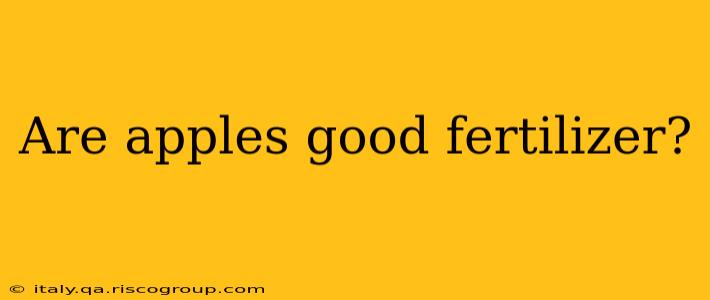Apples are a delicious treat, but what happens to the cores, peels, and bruised bits? Instead of tossing them, consider the potential of apple waste as a valuable addition to your garden. While not a complete fertilizer in themselves, apples offer several benefits when composted or used as mulch. This article will explore the pros and cons of using apples as fertilizer, helping you decide if they're right for your gardening needs.
The Nutritional Value of Apple Waste
Apples contain various nutrients beneficial to plant growth. The peel, in particular, is rich in:
- Potassium: Essential for strong stems and overall plant health. Potassium deficiency often leads to weak plants susceptible to disease.
- Phosphorus: Crucial for root development, flowering, and fruiting. Phosphorus is particularly important during the early stages of plant growth.
- Nitrogen: Though present in smaller quantities than potassium and phosphorus, nitrogen contributes to leafy green growth.
However, it's crucial to understand that the nutrient content in apple waste is relatively low compared to commercial fertilizers. You won't be able to rely solely on apple scraps for a thriving garden.
Composting Apple Waste: The Best Approach
The most effective way to utilize apples as a garden amendment is through composting. Composting breaks down the organic matter, releasing nutrients in a slow-release form that plants can readily absorb. Here's how to compost apple waste effectively:
Adding Apples to Your Compost Pile:
- Chop them up: Smaller pieces decompose faster, speeding up the composting process.
- Avoid moldy apples: Moldy or rotten apples can introduce unwanted pathogens to your compost.
- Balance your compost: Apples are high in carbon, so balance them with nitrogen-rich "greens" like grass clippings or coffee grounds.
- Maintain moisture: Keep your compost pile consistently moist but not waterlogged.
Once composted, the resulting material will be a nutrient-rich soil amendment that improves soil structure, drainage, and aeration.
Using Apple Waste as Mulch
While not as nutrient-rich as compost, apple peels and cores can also be used as mulch. This method offers several benefits:
- Weed suppression: A layer of apple mulch can help prevent weeds from germinating.
- Moisture retention: Mulch helps retain soil moisture, reducing the need for frequent watering.
- Soil temperature regulation: Mulch can help moderate soil temperature, protecting roots from extreme heat or cold.
However, keep in mind that using apple waste directly as mulch may attract pests if not properly managed. It's advisable to chop them finely before applying.
Apples as Fertilizer: The Limitations
While apples offer some nutritional value, relying on them solely as fertilizer is not recommended. Several limitations exist:
- Low nutrient concentration: Apple waste is not a concentrated source of essential nutrients like commercial fertilizers.
- Potential for pests and diseases: Improperly managed apple waste can attract pests or introduce diseases into your garden.
- Slow release of nutrients: The nutrients in apple waste are released gradually through decomposition, making it unsuitable for situations needing immediate nutrient supply.
Conclusion: A Valuable Addition, Not a Replacement
Apples are not a complete replacement for balanced fertilizers. However, when composted correctly, apple waste becomes a valuable asset to any gardener. Its contribution to soil health, through improved structure and gradual nutrient release, makes it a sustainable and eco-friendly way to enrich your garden. By understanding its limitations and utilizing it effectively through composting or mulching, you can harness the hidden potential of this readily available resource.

